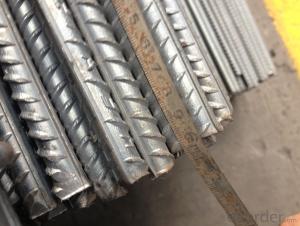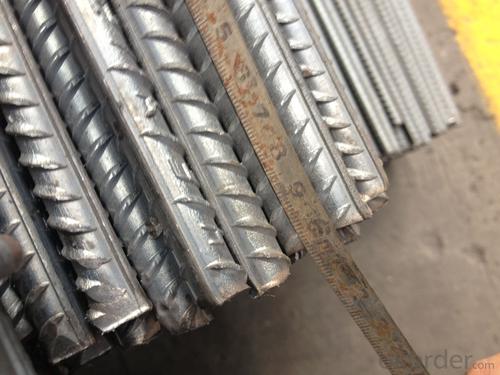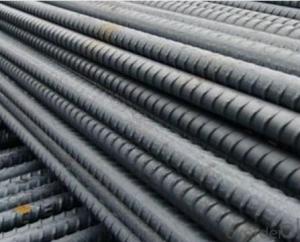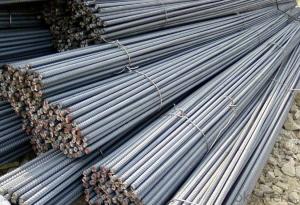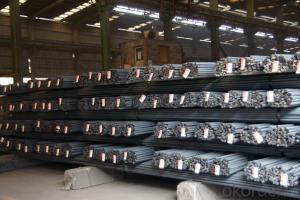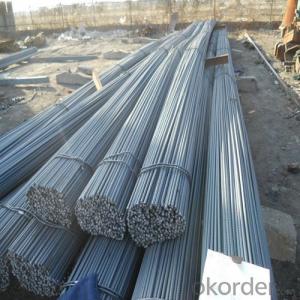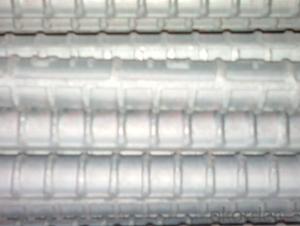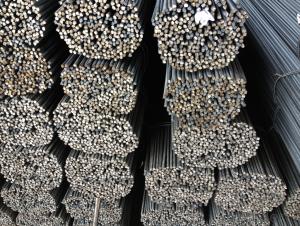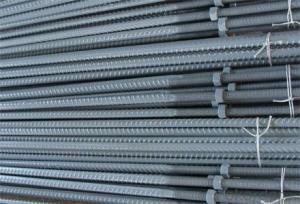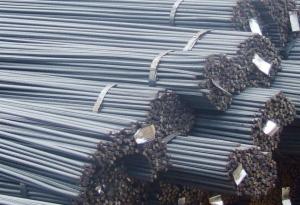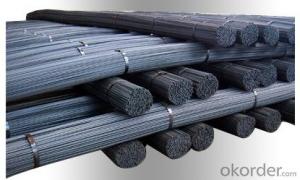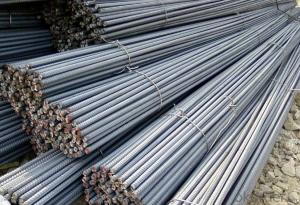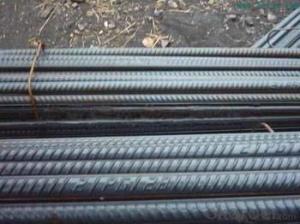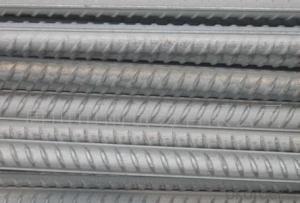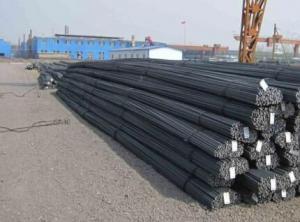Steel Deformed Rebars ASTM GR40
- Loading Port:
- China Main Port
- Payment Terms:
- TT or LC
- Min Order Qty:
- -
- Supply Capability:
- -
OKorder Service Pledge
OKorder Financial Service
You Might Also Like
Product Description:
OKorder is offering Steel Deformed Rebars ASTM GR40 at great prices with worldwide shipping. Our supplier is a world-class manufacturer of steel, with our products utilized the world over. OKorder annually supplies products to African, South American and Asian markets. We provide quotations within 24 hours of receiving an inquiry and guarantee competitive prices.
Product Applications:
Steel Deformed Rebars ASTM GR40 are ideal for structural applications and are widely used in the construction of buildings and bridges, and the manufacturing, petrochemical, and transportation industries.
Product Advantages:
OKorder's Steel Deformed Rebars ASTM GR40 are durable, strong, and wide variety of sizes.
Main Product Features:
· Premium quality
· Prompt delivery & seaworthy packing (30 days after receiving deposit)
· Can be recycled and reused
· Mill test certification
· Professional Service
· Competitive pricing
Product Specifications:
Manufacture: Hot rolled
Grade: ASTM GR40,GR60
Size: 6mm-32mm
Certificates: ISO, SGS, BV, CIQ
Length: 6m – 12m, as per customer request
Packaging: Export packing, nude packing, bundled
| DEFORMED BAR | |
| SIZE d(mm) | theoretical kg/m |
| 6 | 0.222 |
| 8 | 0.395 |
| 10 | 0.617 |
| 12 | 0.888 |
| 14 | 1.21 |
| 16 | 1.58 |
| 18 | 2 |
| 20 | 2.47 |
| 22 | 2.98 |
| 25 | 3.85 |
| 28 | 4.83 |
| 32 | 6.31 |
FAQ:
Q1: How soon can we receive the product after purchase?
A1: Within three days of placing an order, we will arrange production. The normal sizes with the normal grade can be produced within one month. The specific shipping date is dependent upon international and government factors, the delivery to international main port about 45-60days.
Q2: How do we guarantee the quality of our products?
A2: We have established an advanced quality management system which conducts strict quality tests at every step, from raw materials to the final product. At the same time, we provide extensive follow-up service assurances as required.
Q3: what is the difference between actual weight and theoretical weight?
A3: All the section steel has two weights: actual weight and theoretical weight. Actual weight is the weighing out when the product delivered from the mill. Theoretical weight is calculated by pieces. The invoice can be based on each of them as your request.
Images:
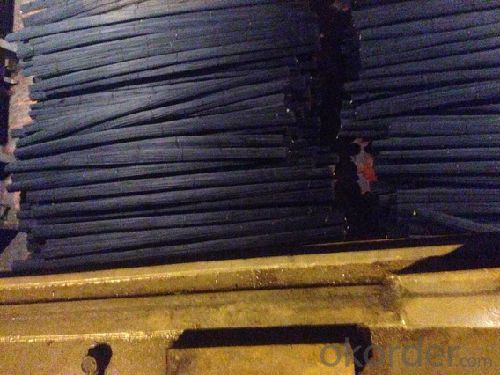
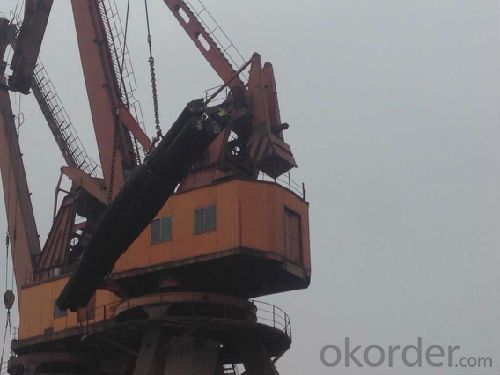
- Q: What is the role of steel rebars in maintaining structural integrity?
- Steel rebars play a crucial role in maintaining structural integrity by reinforcing and strengthening concrete structures. They provide tensile strength to resist cracking, bending, and shearing forces, enhancing the overall stability and durability of buildings, bridges, and other infrastructure.
- Q: What are the common misconceptions about steel rebars?
- Steel rebars are often mistakenly thought to be exclusively used in large construction projects. While they are indeed commonly employed in the construction of big buildings, bridges, and other infrastructure, they are also utilized in smaller endeavors such as residential homes, retaining walls, and even garden structures. By providing strength and reinforcement to concrete structures, rebars ensure the durability and longevity of these constructions. Another misconception pertains to the assumption that all rebars are identical. In reality, there are numerous types of rebars available, each possessing unique characteristics and serving specific purposes. Some common variations include carbon steel rebars, epoxy-coated rebars, stainless steel rebars, and galvanized rebars. The particular type selected depends on factors such as the environment, exposure to corrosive elements, and project requirements. Additionally, there is a misconception that rebars can be haphazardly placed or spaced within a concrete structure. However, improper placement or inadequate spacing of rebars can result in structural weaknesses, compromising the integrity of the concrete. It is essential to adhere to engineering specifications and guidelines to ensure that the rebars are correctly positioned and spaced, thus providing optimal reinforcement. Furthermore, there is a belief that steel rebars are prone to rusting. While it is accurate that steel can corrode when exposed to moisture and oxygen, construction practices can greatly mitigate this risk. For instance, the use of epoxy-coated or galvanized rebars offers an additional layer of protection against corrosion. Additionally, appropriate concrete cover and the application of protective coatings can prevent moisture penetration and prolong the lifespan of the rebars. Lastly, some individuals argue that steel rebars are costly and not cost-effective. Although it is true that steel rebars can contribute to the overall expenses of a construction project, they are an indispensable investment in ensuring structural integrity and safety. The cost of repairing or replacing a structure due to insufficient reinforcement far exceeds the initial investment in quality rebars. Furthermore, the use of rebars can reduce the need for excessive concrete, resulting in cost savings in terms of materials and construction time. In conclusion, it is imperative to debunk prevailing misconceptions surrounding steel rebars. They are not solely limited to large construction projects, they come in various types, necessitate proper placement and spacing, can be safeguarded against corrosion, and represent a cost-effective investment in guaranteeing the durability and safety of concrete structures.
- Q: What are the different types of steel rebars used in underground constructions?
- There are several different types of steel rebars that are commonly used in underground constructions. These rebars are used to reinforce concrete structures and provide additional strength and durability. 1. Carbon Steel Rebars: Carbon steel rebars are the most commonly used type of rebars in underground constructions. They are made from carbon steel and have high tensile strength, making them suitable for various applications. 2. Epoxy-Coated Rebars: Epoxy-coated rebars are carbon steel rebars that are coated with an epoxy layer. This coating provides corrosion resistance, making them ideal for underground constructions where moisture and chemicals are present. 3. Stainless Steel Rebars: Stainless steel rebars are highly resistant to corrosion and have excellent strength properties. They are often used in underground constructions where extreme environmental conditions, such as high humidity or saltwater exposure, are expected. 4. Galvanized Rebars: Galvanized rebars are carbon steel rebars that have been coated with a layer of zinc. This coating provides enhanced corrosion resistance, making them suitable for underground constructions in areas with high levels of moisture or exposure to chemicals. 5. Fiberglass Rebars: Fiberglass rebars are made from glass fibers embedded in a resin matrix. They are lightweight, corrosion-resistant, and have high tensile strength. Fiberglass rebars are often used in underground constructions where non-magnetic properties are required, such as near sensitive equipment or in areas with electromagnetic interference concerns. Each type of steel rebar has its own advantages and is selected based on the specific requirements of the underground construction project. Factors such as environmental conditions, load-bearing capacity, and expected lifespan are considered when choosing the appropriate type of steel rebar for a particular application.
- Q: How are steel rebars anchored in concrete foundations?
- Steel rebars are anchored in concrete foundations by using various methods such as overlapping rebars, hooking them into the concrete, or using mechanical devices like rebar couplers. These anchoring techniques ensure that the rebars are securely embedded in the concrete, providing strength and stability to the foundation structure.
- Q: What is the diameter range of steel rebars?
- The diameter range of steel rebars typically varies from 6mm to 50mm.
- Q: Can steel rebars be used in the construction of underground parking garages?
- Yes, steel rebars can be used in the construction of underground parking garages. Steel rebars are commonly used as reinforcement in concrete structures, including underground parking garages, to enhance the overall strength and durability of the construction. The use of steel rebars helps to prevent cracking and structural failures, making them an essential component in underground parking garage construction.
- Q: How are steel rebars used in industrial buildings?
- Steel rebars are used in industrial buildings to reinforce concrete structures and increase their strength and durability. They are commonly used in beams, columns, and slabs to resist tensile and compressive forces, ensuring the overall stability of the building.
- Q: Can steel rebars be used in the construction of airport runways and taxiways?
- Yes, steel rebars can be used in the construction of airport runways and taxiways. Steel rebars provide strength and reinforcement to the concrete used in these structures, ensuring their durability and ability to withstand heavy aircraft traffic.
- Q: How do steel rebars affect the thermal conductivity of concrete structures?
- Steel rebars have a significant impact on the thermal conductivity of concrete structures. The inclusion of steel rebars in concrete increases the overall thermal conductivity of the structure. This is because steel has a much higher thermal conductivity than concrete. Consequently, heat transfer through the concrete is facilitated by the presence of steel rebars, leading to a higher overall thermal conductivity of the structure.
- Q: Can steel rebars be used in school construction?
- Yes, steel rebars can be used in school construction. Steel rebars provide strength and durability to reinforced concrete structures, making them suitable for various construction applications, including schools. They help reinforce the concrete and enhance its load-bearing capacity, ensuring the safety and longevity of the building.
Send your message to us
Steel Deformed Rebars ASTM GR40
- Loading Port:
- China Main Port
- Payment Terms:
- TT or LC
- Min Order Qty:
- -
- Supply Capability:
- -
OKorder Service Pledge
OKorder Financial Service
Similar products
Hot products
Hot Searches
Related keywords
